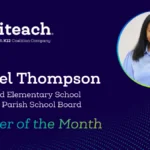During the iteach alternative teacher certification program, you will be paired with an experienced teacher supervisor. Your iteach supervisor will likely be a retired teacher who lives in your area. In the state of Texas, your iteach supervisor must observe your classroom three times during your first semester and twice during your second semester in the program.
When preparing for your supervisor’s observations, communicate openly with your supervisor, make sure you have a plan in place, create an engaging lesson, prepare to ask for anything specific you would like to receive feedback on and relax because your supervisor is there to be a partner in your teaching journey.
The Perks of iteach Supervisor Observations
Having an experienced teacher there to support you during your teaching journey is a gift. iteach supervisors are consistently working with first-year teachers, so they know the ins and outs of the struggles teachers face. You can think of your supervisor as a mentor who doesn’t work in your school building so that they can provide extremely objective advice and feedback. Your supervisor can be a sounding board when you are struggling with something in the classroom or even just guide you in the right direction.
Your supervisor will likely be the first person to observe you in the classroom, which can seem a bit overwhelming. Remember that your supervisor is there to support you during your teaching residency, so treat your observations as a time to try new things in the classroom and get feedback from a seasoned teaching professional!
Setting Up Your Observations
Your supervisor will reach out at the start of the semester to introduce themselves and get to know you. iteach supervisors want to make sure that you are successful during your observations, so they will lean on you to determine the best time for your observations. During the first semester, you are required to have three observations, which means that your first observation will likely be within the first month of the semester. Remember, this is your first observation! You are a brand new teacher, so you have so much time to grow and improve your craft. You will not be a perfect teacher during your first observation. You will never be a perfect teacher because you are human, and that is okay.
When planning your first observation, ensure you create a lesson plan that engages students but also highlights areas where you are looking for feedback. Maybe that is with your classroom management, instruction before an activity, or one-on-one student engagement. Whatever it may be, try to use these observations as a time to get feedback and support from someone who is only looking to guide you and wants to see you succeed.
Plan an Engaging Lesson
You are required to share your lesson plan with your supervisor. The school where you are employed may have a specific template they use for lesson plans. Be sure to check with your supervisor that they are comfortable with the template you plan to use. I currently use the iteach lesson plan template that candidates are required to use for coursework. I find it includes all the critical components of a comprehensive lesson plan and is simple and direct.
When determining the lesson you want to cover for your observation, think about how you can show what you have learned during your coursework. For me, I wanted to focus on Culturally and Linguistically Responsive Teaching activities that I learned about in course 5600.
The Week of Your Observation
We know that teachers always need to be prepared to pivot. Since things can change quickly, I send over the lesson plan and any complementary materials about two days before the observation. This way, I know the general material covered will stay the same. If I did not get through everything the day before, I can easily make small changes to the lesson and share them with my supervisor when they arrive.
Before my first observation, I wanted to make sure my supervisor had everything they needed to know about school visitor policies. I sent her an email detailing where to park, what office to check in at, and instructions on how to get to my classroom.
The Day of Your Observation
I moved a desk to the back of the classroom so she could easily observe the entire space. Additionally, I printed the lesson plan and accompanying materials so she could follow along and placed those on the desk. When my supervisor arrived, we were able to communicate briefly before class began. I was nervous, but she reassured me that she was there to support me. I took a deep breath and started my class like any other day.
After each observation, your supervisor will provide you with feedback a few days after their visit. Take this feedback in; know it is only there to support you and help you grow as a teacher. If you have any questions about the feedback, just ask!
Additional Observations
Continue to challenge yourself with each observation to try new strategies with your students. Challenging yourself will push you to grow and help your supervisor see the strides you are making within your first two semesters in the classroom. Also, remember that your supervisor understands things happen during the school year. For example, I had an observation scheduled and then was pulled to proctor an exam the day before. I now would miss a day of class and need to push all my lessons for the week, and I did not feel prepared for my observation. I reached out to my supervisor immediately to explain the situation, and she was completely understanding and worked with me to find a new day to come.
With each observation, take a deep breath, challenge yourself to something new, and trust that you are doing your best in your first year in the classroom. Remember that you have support from your school, the iteach team, and, especially, your iteach supervisor. We can do this!
Morgan Greenberg is an English Language Arts teacher in Austin, TX. She worked most of her career in marketing and communications in the ed-tech industry before transitioning into teaching. Morgan hopes to inspire her students to become lifelong readers and writers. In her free time, she enjoys practicing yoga and spending time in nature, hiking, biking, or camping.




